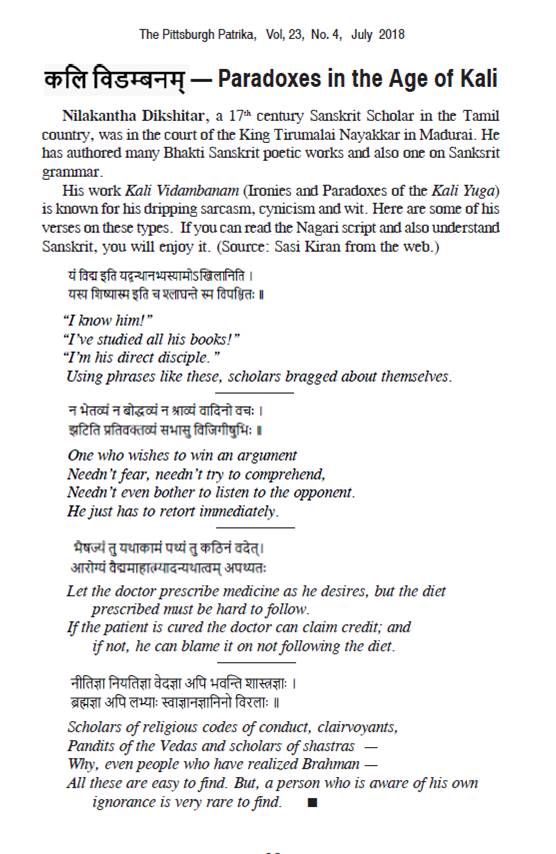Archive for category July 2018
Kali Vidambanam — Paradoxes in the Age of Kali
Posted by admin in July 2018, Past issues on July 23, 2018
Good Bye to Swim Suit in Beauty Pageants
Posted by admin in July 2018, Past issues on July 22, 2018
Premlata Venkataraman
ThePatrika@aol.com
The Miss America contest has scrapped its swimsuit competition, striking at the most derided part of the contest. It is long overdue. Coming in the wake of the #MeToo movement that exposed sexual harassment — actually, sexual abuse — of women in many walks of life, this is a blow to the outdated, voyeuristic and prurient aspects of beauty contests.

The Swim-Suit picture of Miss America 1962, staid by today’s standards.
In recent years, viewership interest — and corporate sponsorship — in beauty pageants have been dwindling in industrialized societies in the backdrop of changing social mores and attitudes between men and women and in the way society judges women. At least in public discourse, men and women in the First World rejected the idea of subjecting women to this kind of objectified evaluation in terms of the size of their bust, waist and buttocks and how well they filled a bikini. The Feminist Movement and women with professional degrees joining the work force in large numbers in the last several decades have contributed to this transformation.
Sadly, however, this contest is gaining feverish attention from emerging countries like India and China, and in Latin America, and parts of less developed parts of Europe. To capture a greater share in high-end middle class markets

By 2015, only bare essentials are covered with not much left to cover Swim Suit parade.
in cosmetics and designer apparel, global companies now sponsor these events in Asia. Never mind that it goes against the prevailing culture of modest attire in these countries.
With the Second and the Third World aping their Western counterparts in everything (see the swim suit photoshoot on the next page in the 2017 Miss India contest), here too, I am sure, they will ape the West by scrapping the bikini contest, going forward.
That is why it is important that Women’s Movements retain the cultural values of their lands, even as they work towards bringing fundamental changes to reduce gender-based violence and domestic abuse.

Indians are catching up with the West… … in this too. Miss Miss India Suit 2017.
There is a visual image associated with social workers in India. They are called jholiwalas and Jholiwalis, because they always wear simple khadi clothes with a cloth bag slung over their shoulders. To convey their important message they always wear simple cotton dresses in local designs.
I am glad Miss America 2.0 did away with the swimsuit (bikini) category. It is time women are judged not only for their attractive looks in attractive everyday clothes, but also for their wit and intelligence.   ♣
Home
Indian Poets: Cynical, Sarcastic, Humorous All at the Same Time
Posted by admin in July 2018, Past issues on July 22, 2018
By Kollengode S Venkataraman
ThePatrika@aol.com
Many short verses in Indian languages deal with honor, dharma, compassion, beauty, obligations and responsibilities, romance, love, devotion and bhakti — in high-brow and uplifting tones. But many are also known for their dripping sarcasm, cynicism, and hard realities of life.
Here are two 4-line alliterating and rhyming Tamil verses in the latter category. Nothing is known about the authors of these verses. (Source: Viveka Chintamani, editor Gna. Manikkavasagam, Uma Pathippagam, Chennai, 600 001, Year 2001). However, on the basis of the words and phrases in them, one can say that these verses cannot be earlier than 1700 AD. With Tamil having at least 2500 years of literary history, these verses are, therefore, relatively recent, only 300 years old. Here is the original of the first Tamil verse:

Here is a nonliterary translation:
Once they become adults, sons won’t listen to their fathers’ advice;
After middle age, wives wearing fragrant flowers won’tÂ
       care for their husbands;
After learning from teachers, shishyas (students) don’t goÂ
       looking for their gurus, and
Once cured of their diseases, people don’t seek their doctors.
In the above translation, if we replace “sons†with “children†to indicate both sons and daughters, and “fathers†with “parents,†It will be a lot closer to the reality of contemporary family life.
The next verse is on a topic that we all are familiar with — unsolicited advice. As parents, friends, and employees we recognize that unsolicited advice — even suggestions — is not welcome. This is the case whether we give suggestions to others, or we receive advice from others. Often, such advice breeds resentment, if not hostility, among the people involved, whether friends, colleagues, or relatives.
Such behavior in human interactions is nothing new. Here an anonymous poet explains this axiom using great wit, sarcasm, and cynicism. First the original in Tamil:

Here again is a nonliterary translation since I don’t have the skills for translating the poem into verse form:
A weaver bird, sitting in its cozy nest in rains, saw a monkey                     Â
    getting drenched, and said,
“Why don’t you build a place for yourself against the rain?â€
Irritated at the advice, the monkey got mad, went wild, andÂ
     shredded the weaver bird’s nest to smithereens.
Such is the fate of those giving unsolicited advice
     to the undeserved.    ♣
Home
Further Along the Kerala Coast… …
Posted by admin in July 2018, Past issues on July 22, 2018
By Premlata Venkataraman
thepatrika@aol.com
Driving from Coimbatore last December, we reached the Ernakulam-Kochi metro area. The roads and streets of Kochi had the usual hustle and bustle. Decades before, it was a much smaller, relaxed town. As we
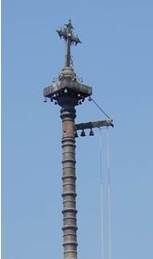
Eastern Cross atop a Dwajastambham.
passed a place of worship getting a new coat of paint, we assumed they were getting ready for the upcoming Ulsavam (festival). It was a typical Kerala structure. The kodi maram (dwajasthambham), the ceremonial copper flagstaff was being cleaned; we noticed that it had an Eastern Orthodox Cross atop it. Intrigued, found that this was a Syrian Orthodox church and they were getting ready for Christmas! Now, this in a
snapshot, was the southern part of Kerala!
Serene and bucolic, Cochin has been welcoming traders, explorers and travelers to its

     Church in Alappuzha.
shores for centuries. They have left their mark — a 400-year old synagogue, churches that resemble Hindu temples and also ancient mosques set up by Arabic traders, long before the advent of Islam via the Turkic invasions. The first mosque ever built in India was in Kerala.
Of course, many old and ancient temples are open for worship with tens of thousands of devotees offering vazhipaadu (special worships) and fulfilling nerchas (vows) unbroken through very many more centuries. This setting of various places of worship reflecting so many major religions is a reflection of the makeup of the denizens of Kochi. Hindus are 44 % of the population, followed by 38 % Christians, and 18 % Muslims. There is very little religious strife in this town unlike many other cities in India. The high literacy rate of 98% in Kerala could be one reason.

The Bhagavatghi Temple in Alappuzha.
No visit to this part of the country is complete if we do not include a boat trip on the backwaters along the Arabian coast of Southern Kerala. After a visit to the ancient Bhagavathy temple in Alappuzha, near Kochi, we went into the modern resort of Punnamada to savor the beautiful backwaters. Floating along the rivers in a small open boat with several houseboats going past us, it was idyllic. We floated past neighborhoods along very
narrow canals barely 20-feet wide and navigable only in motorized canoes. It was amazing how people have made a lifestyle along this maze of intricate waterways.

    Temple worshipped by Adi Shankara in Kaaladi.
Though the waters were clear and lapped gently along the sides, you could see the water hyacinth (an invasive species of water plant) choking the waterways and affecting the aquatic life beneath. One

          A house boat in Kerala Kaayals.
hopes they find a way to rid these pests from destroying the natural flora and fauna of the waterways.
People living in Kerala have learned to live with water. You could see cheena valas (Chinese nets in Malayalam) dotting the seashores in Kochi. (See below the picture of the nets used to catch fish.) Now they are used mainly as a tourist attraction. With abundant coastlines and

            Cheena Valaas in Kochi.
backwaters, seafood is a staple in the Kerala diet for many. People use the waterways to go to work (see the photograph below). These special ferries worked like bus routes along the waters.

    A “commuter” boat in the Kerala backwaters.
It was a near perfect vacation, though very, very short. Soothing to the eyes and the spirit, a vacation trip to Southern Kerala is a must for any traveler in South India.   ♣
Home
Federal Indictments on Five Area Healthcare Providers in Opioid Case
Posted by admin in July 2018, Past issues on July 22, 2018
By Kollengode S Venkataraman
ThePatrika@aol.com
Federal prosecutors have indicted five area physicians for illegally prescribing Suboxone, a drug meant for treating opium addicts for mitigating withdrawal-related problems. Buprenorphine, marketed under trade names Suboxone and Subutex, among others, wards off the painful symptoms of opioid withdrawal and lessens cravings. The five physicians worked as contract employees at Redirection Treatment Advocates, LLC, (RTA) a business engaged in rehab work for opium addicts.
The federal indictments allege, “… the defendants, working as contractors at various locations, created and distributed unlawful prescriptions for buprenorphine, known as Subutex and Suboxone, a drug that should be used to treat individuals with opium addiction. The defendants are also charged with conspiracy to unlawfully distribute buprenorphine.†The defendants are charged also for allegedly causing fraudulent claims to be submitted to Medicare or Medicaid for payments to cover the costs of the unlawfully prescribed buprenorphine.â€
Details of the federal indictments are here: www.justice.gov/opa/pr/five-pennsylvania-physicians-charged-unlawfully-distributing-buprenorphine-and-defrauding. The healthcare providers indicted in federal courts in Pittsburgh and West Virginia are Krishan Aggarwal, 73, and Madhu Aggarwal, 69, both from Moon Twp; Cherian John, 65, of Coraopolis; Parth Barill, 69, of Pittsburgh; and Michael Bummer, 38, of Sewickley. An indictment is only an accusation. A defendant is presumed innocent unless and until proven guilty in a court of law.
Krishan Aggarwal, Madhu Aggarwal (OB-GYN) and Parth Barill, a gastroenterologist, earned their medical degrees from Rajasthan, India. Cherian John, earned his medical degree from Mumbai.
In a statement released, the US Attorney General Jeff Sessions said, “Today we are facing the worst drug crisis in American history, with one American dying of a drug overdose every nine minutes.â€
While announcing the indictment, US Attorney for Western Pennsylvania Scott Brady said, “Expanding the legitimate use of medication to treat addiction is a critical part of this administration’s multi-faceted approach to combat the opioid epidemic ravaging our communities. Yet another vital component is the prosecution of unscrupulous practitioners who abuse their privilege to practice medicine and dispense prescriptions unlawfully. These indictments demonstrate that we remain vigilant in our pursuit of physicians who ignore their oath to do no harm.â€Â   ♣
Home
Samar Saha: An Enthusiastic Organizer of Hindustani Music, Host & Patron for Musicians
Posted by admin in July 2018, Past issues on July 22, 2018
By Shailesh Surti, O’Hara Township, PA
Shailesh.surti@gmail.com
Editor: Music lovers here know Samar and Mala Saha of Irwin as great enthusiasts of classical Hindustani music, having enjoyed many 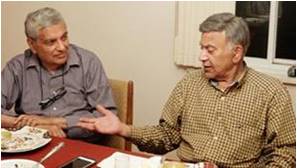 house concerts at the Sahas’ home in Irwin. In this engaging story, Shailesh Surti (left in the adjacent picture) draws out Samar Saha (right in the picture) on his exhilarating journey from his casual interest in Hindustani music to serious, passionate listener, organizer, host, and finally to patron of the music, and more importantly, of the musicians. The venue for this exchange was Shailesh’s home in O’Hara Twp, with his wife Urvashi as the gracious host. Â
house concerts at the Sahas’ home in Irwin. In this engaging story, Shailesh Surti (left in the adjacent picture) draws out Samar Saha (right in the picture) on his exhilarating journey from his casual interest in Hindustani music to serious, passionate listener, organizer, host, and finally to patron of the music, and more importantly, of the musicians. The venue for this exchange was Shailesh’s home in O’Hara Twp, with his wife Urvashi as the gracious host. Â
For any type of performing art — music and dance recitals, drama and live stage performances — to flourish anywhere, one needs art lovers, organizers, and patrons willing to underwrite a good part of the expenses above and beyond gate collections.
It is a well-recognized truism that “classical†art forms simply cannot sustain themselves merely on the basis of ticket-buying audience
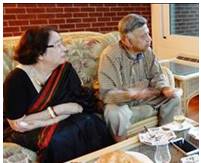
Mala and Samar Saha at the Surti residence.
support. This is the reality today both in Indian and Western performing arts. In the US, corporations and individual donors make huge contributions to symphonies and operas. In Europe, public funding for the performing arts has been the norm. In India, without corporate and government sponsors, the performing arts simply cannot survive.
 The Indian performing arts scene here: Pittsburgh has only around 20,000 Indian-Americans, with
fewer classical music enthusiasts compared even to Cleveland, which is demographically comparable to Pittsburgh on many measures. Here, Sri Venkateswara Temple has been organizing and patronizing classical Indian music concerts — especially Karnatic music — on a regular basis. Other temples also have done so in the past. Students of the Pandit Jasraj Institute of Music have organized concerts of artistes belonging to their gharana.
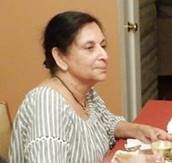
Urvashi Surti, the gracious host of the evening.
Fortunately, a few individuals, on their own drive and initiative, have been active in organizing Hindustani music concerts in Pittsburgh for a long time. For over 30 years, Dr. Balwant Dixit, under the banner of the Center for the Performing Arts of India at the University of Pittsburgh, organized many such events, both in Pittsburgh and around North America with concert tours for Indian artistes. In the early days, Dixit also organized Karnatic music programs in our town.
With Dixit now in retirement, Samar Saha and his wife Mala of Irwin have taken on the mantle for organizing Hindustani music concerts. Music lovers in our area owe the Sahas a big Thank You not only for their enthusiastic support for the art form, but also, more importantly, for their multi-faceted patronage for the artistes. The Sahas moved into the Pittsburgh area fifteen years ago after Samar retired from a job in New Jersey. Samar, a metallurgist by profession, joined US Steel’s R&D after arriving from New Jersey.
Samar had his early schooling in Banaras where he got interested in learning the tabla. But his father would not encourage him to go
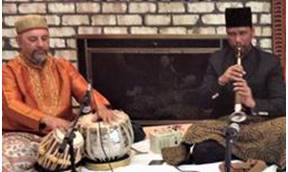
Ustad Haidar Hassan on the shehnai accompanied by Pt. Samir Chatterjee (tabla).
into music. Samar used a colorful expression to describe how his father reacted when he told his dad he wanted to pursue music.
Later, his interest in classical music blossomed when he went to college in Kolkata. During his tumultuous college days in the 1960s, with the Naxalbari Movement in full swing in Bengal, Samar managed to attend all-night concerts of artistes of great repute. His interest in cultivating a keen interest in music and musicians was greatly reinforced.
Samar even dabbled in western music in college. In 1975, he married Mala — it was an arranged marriage. Mala had her training in Rabindra Sangeet and Hindustani classical music. So it was natural both the Sahas are passionate about music.
The Sahas’ move to the US in the early 1970s directly as green-card holders was quite accidental. They settled down in New Jersey. While in New Jersey Samar became part of the Bengali Cultural Organization Kallol.

   Rajyashree Ghosh
At Kallol he introduced Hindustani cassical music concerts despite the apprehension of some members that it might not go well with their members. With the concerts well-liked by the members, Samar got first-hand experience in organizing music recitals and dealing with artistes.
The Sahas also came in contact with the tabla maestro Pandit Samir Chatterjee and his organization Chhandayan of New York. Chhandayan has been active with Indian musicians of every genus, innovating and experimenting with fusion, and tabla orchestra with vocalists. Chhandayan selects and invites artistes to perform around the USA.
With their long-standing association with Samir Chatterjee, Samar and Mala snap up opportunities to invite artistes and host them at their home. Asish and Nidrita Sinha of Cheswick are always there playing key roles in the organizing details.
Hosting artistes is not a simple job. By nature, artistes can be temperamental and picky. Receiving them at the airport, driving them around and dropping them back is a chore. But catering to their minute needs in food preferences and other needs is a different type of challenge. Samar and Mala have mastered the art of dealing with artistes.
Sometimes for a well-known artist the venue is moved to a formal auditorium, like the last concert this May of vocalist Ashwini Bhide Deshpande at the Frick’s Fine Arts’ Auditorium in Oakland. Many instrumentalists and vocalists, enjoying the Sahas’ hospitality at their home, have given their best recitals. Last year we enjoyed the Sarod player Sri Atish Mukhopadhyay accompanied on the tabla by Sri Tejas Tope. The other notable program was the nearly 3 hour memorable solo shahnai recital by Ustad Hasan Haide. Pt. Samir Chatterjee accompanied him on the tabla. Reviews of several of these recitals have appeared in the Patrika written by    knowledgeable music enthusiasts living among us.
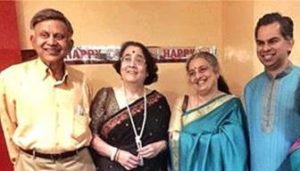
L to R: The Sahas, Ashwini Bhide and her Harmonium accompanist Kedar Naphade.
The Sahas have a lovely home in Irwin with a great room that can accommodate a small audience of up to fifty music enthusiasts to enjoy live performances. Samar has equipped his beautifully decorated home with a good sound system. Listening to the music is not the only treat at his place. The ambiance of a private house concert offers wonderful opportunities to interact with the artistes. The artistes too have said during the post-recital interactions that the sterile and formal atmosphere in large concert halls is no match for the instantaneous rapport they make with their audience sitting only feet away from them in house concerts. The concert is always followed by a scrumptious dinner, usually organized in potluck fashion with many in the audience bringing home-cooked delicacies.
The Sahas take great pride in hosting talented, young artistes, who give their very best in trying to establish themselves in the field. Many of them will never forget the Sahas’ patronage. The Sahas also encourage our own home-grown talents like vocalist young Ayan Sinha. Here are some of the artistes who have performed at the Sahas’ place:
- Padma Bhushan Pt. Buddhadeb Dasgupta (Sarod) opened the house concert with his blessings for success. His son, Anirban Dasgupta, another Sarod player played with him. August, 2012.
- Flutist Steve Gorn — April, 2013
- Classical Vocalist Mitali Bhowmik — May, 2014
- Thumri, Dadra and Ghazals by Rita Ganguly and Sitarist Amie Maciszewski — October, 2014
- Classical Vocalist Samarth Nagarkar — May 2015
- Thumri, Dadra and Durga Vandana Singer Rajyasree Ghosh — October, 2015
- Sitarist Abhik Mukherji and Flutist Jay Gandhi Jugalbandi — April 2016 (during the wedding reception of the Sahas’ daughter, Elena)
- Classical Vocalist Sanjoy Banerjee — April, 2017
- Shehnai Haidar Hassan – son of Shehnai Nawaz Late Ut. Ali Ahmed Hussain Khan -— May 2017
- Sarodist Atish Mukhopadhyay — October 2017
- Classical Vocalist Ashwini Bhide — May 20, 2018
Without letting anybody know (until now), very often, the Sahas, like true patrons of arts, have contributed from their own resources, a lion’s share of the total expenses for many of these concerts. This is in addition to hosting the artistes in their home for several days before and after the recital.
That they are Hindustani music enthusiasts is well-known. Further, without any institutional support here, and on their own strength, they are also warm hosts, efficient organizers, and generous patrons of the art and the artistes, all rolled into one. The Sahas are unique in this respect.  ♣
Home
Consul General of India Visits the Asian Studies Center at Pitt
Posted by admin in July 2018, Past issues on July 22, 2018
The Asian Studies Center at the University of Pittsburgh was delighted to host the Consul General of India, Mr. Sandeep Chakravorty, on March 28th and 29th 2018. The Consul General was invited to by the University of Pittsburgh for a major conference “Rethinking South-South Cooperation: India and Brazil in the 21st Century,†organized under the auspices of the University Center for International Studies.
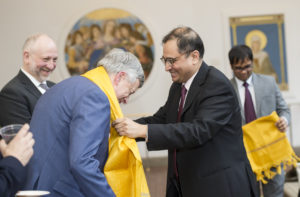
Consul General Sandeep Chakravorty facilitates Pitt’s Chancellor Emeritus Mark Nordenberg with a traditional Indian scarf. Extreme left is Vice Provost of Global Affairs Ariel Armony,
In conjunction with this, the Consul General of India participated in a series of events focused on the development of Indian Studies, toured the Indian Nationality Room in the Cathedral of Learning and met with a group of students representing a tremendous cross-section of interests in Indian Studies in particular and South Asia more broadly. Mr. Chakravorty and his staff have been extremely helpful in working with senior leadership at the University of Pittsburgh, and with Ms. Riva Ganguly Das, Director General of the Indian Council for Cultural Relations, to establish the ICCR Chair in Indian Studies.
Over the course of the next five years, this important initiative will bring leading scholars from universities in India to the University of Pittsburgh to teach courses that focus on Indian society and culture in the humanities and social sciences.
The ICCR Chair in Indian Studies will serve to anchor and help to develop an important initiative. Recognizing the growth and development of South Asia, the Asian Studies Center at the University of Pittsburgh is committed to expanding faculty research and teaching expertise on the global significance of this significant region of the world.
Beyond the academic significance of the “India Initiative†at the University of Pittsburgh, the establishment of the ICCR Indian Studies Chair will serve as an important bridge to the community.
In conjunction with this goal, Consul General Chakravorty was able to meet representatives of Pittsburgh’s community who have contributed to Indian studies over the years, most especially those who have played a vital role in building and supporting the Indian Nationality Room  ♣
Home
The Wadhwani Institute of Artificial Intelligence Inaugurated in Mumbai
Posted by admin in July 2018, Past issues on July 22, 2018
By K S Venkataraman
ThePatrika@aol.com
Sunil Wadhwani and his wife Nita are well known in our region’s city and county governments and civic institutions. He was the founding CEO of i-Gate, a global software company, known in its previous incarnation as Mastech, a company he co-founded with Ashok Trivedi. At the peak of his career as the CEO of i-Gate, over 30,000 employees were on its payroll in 70-plus offices worldwide with over $1 billion in annual revenue.
In the middle of this, Sunil took great interest in promoting Pittsburgh, a second-tier US City, as the destination of choice for national and international businesses to relocate or open their offices. At the same time, Wadhwani also worked with city and county elected officials to diversify the region’s population making it attractive for immigrants, a feature that global businesses consider desirable in their decision to relocate or open a new office in a new place. After all, our region has all the accoutrements needed — affordable housing, good public and private schools, excellent medical facilities, universities, sports teams, museums, and other entertainments…
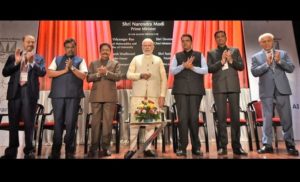
Sunil Wadhwani is extreme left and his elder brother Romesh Wadhwani is extreme right. Maharashtra’s Governor Mr. C Vidyasagar Rao is third from left and Chief Minister Mr Devendra Fadnavis is third from right, on the stage during the inaugural function. Prime Minister Modi is in the middle.
In 2015, Capgemini, a French IT services company, acquired i-Gate for over $4 billion. Now, Wadhwani is in semi-retirement, yet active in running SWAT, a venture capital company based in Moon, as a managing partner, along with Ashok Trivedi.
“Most of us who grew up in India and moved to the US have been extremely fortunate. We had parents who cared for us and had the means to educate us in good schools and send us to the US. Many billions of people around the world — especially those struggling in poverty in India and other developing countries — are not so lucky. It is up to us to help our fellow human beings who have not been as blessed.†Sunil’s thoughts have been drifting along these lines for quite some time.
So he decided to put a small portion of his resources to good use in India, with possibilities of having a global impact. Joining with his older brother Romesh Wadhwani, a California-based venture capitalist, the two Wadhwanis each donated $15 million and founded the Wadhwani Institute for Artificial Intelligence (WIAI). The thrust of the Wadhwani Institute is “harnessing the power of AI to solve deep-rooted problems in healthcare, education, agriculture, and infrastructure to accelerate social development.†Though the institute’s beneficiaries can be global, its immediate focus is on the Indian subcontinent and Asia, where it is most needed, and where the impact can be high.
In March of this year, in Mumbai, the Wadhwani Institute of AI went on-stream, with India’s Prime Minister Narendra Modi inaugurating it in the presence of the Maharashtra Chief Minister Devendra Fadnavis, its Governor Vidyasagar and many other dignitaries. In the opening ceremony, Modi said, “The Wadhwani AI institute is a prime example of how the public sector and the private sector can come together with good intentions to build a world-class institute, aimed at benefiting the poor.”
Sunil said, “The government of Maharashtra has committed land, but the details are still being worked out. Currently, ten full-time employees are working at the institute, which is likely to go to 30-plus full-time employees specializing in AI in three years.†Around one hundred researchers from affiliated institutes outside India will be working on AI applications for social good at the institute.
The Wadhwani Institute, a fully independent body, will be closely working with the University of Bombay to develop a master’s program on Data Sciences and AI.
In a press release on the occasion, Sunil said, “AI is a game-changing technology. There’s a lot of research being done at companies like Amazon, Google and Alibaba, and at universities like Carnegie Mellon and MIT. However, virtually all of that is targeted at commercial applications, and there’s little or no research on how to use AI to accelerate social development. Our goal is to have, within the next two years, over 100 researchers working on leveraging AI to improve the quality of life for the bottom two billion people in the world.† So founding this institute is gratifying to the Wadhwani brothers and their families.
Responding to a question, Sunil said, “The institute is looking for hiring the best AI researchers from around the world who are also passionate about social development. Because of our location in India and our initial focus on applying AI to social development in India and other developing countries, most of these have been of Indian origin so far. As we expand, we expect our workforce to become more global in nature.â€
Continuing, he said, “We are forming partnerships with the world’s leading AI research institutions to work together on applying AI to accelerate social development. We have already formed such partnerships with MIT, Carnegie-Mellon University, New York University, the University of Washington, and the University of Southern California.
As part of the launch of the institute in March in Mumbai, Wadhwani Institute hosted a summit of seventy-five leading AI researchers, social sector experts and senior government officials to identify challenges that could be addressed using AI. Ideas discussed included using AI to help farmers on when they should plant their seeds for best crop yields, improving the effectiveness of community health workers, addressing high dropout rates in rural schools, making educational content available in local languages and dialects, and facilitating the early detection of diseases.
Indeed, ambitious objectives for social good on many fronts. ♣
Home
Our Region’s First Nonstop Flight to Asia
Posted by admin in July 2018, Past issues on July 22, 2018
By Kollengode S Venkataraman
ThePatrika@aol.com
After considerable effort, the Allegheny County Airport Authority finally succeeded in cracking into the Asian aviation market with a chartered nonstop flight to Shanghai, operated by China Eastern Airlines, starting this August. One hopes that the charter nonstop flights to Shanghai is just the beginning for Pittsburgh International to get nonstops to other Asian destinations. It must grow into a seasonal and then regular three or four weekly flights all year around.
This nonstop came with a price tag for the region: The airport authority is pitching in up to $560,000 to subsidize the flight. This is essentially tax-payer money. That amount will drop  when Pittsburgh travelers purchase tickets, according to the Authority’s spokesman Bob Kerlik.
 In addition, the VisitPittsburgh tourism agency is kicking in another $300,000, with another $50,000 coming from the Idea Foundry, a Pittsburgh-based nonprofit that works with Chinese families and students to encourage educational ties and investment.
In addition, the VisitPittsburgh tourism agency is kicking in another $300,000, with another $50,000 coming from the Idea Foundry, a Pittsburgh-based nonprofit that works with Chinese families and students to encourage educational ties and investment.
The subsidies are part of a three-year agreement with Caissa Touristic, the tour operator, to market and sell trips to Pittsburgh. However, the flight currently is guaranteed for only one year.
Remember, in the heyday of US Airways at Pittsburgh International we had daily nonstop and direct service from PIT to Paris, Frankfurt, London, Rome, London, Milan… … And then the sky fell for us when US Airways walked away from its hub here, only to eventually disappear altogether from the skies. Recently Pittsburgh International inaugurated nonstops to Europe through WOW and Condor airlines.
The Patrika has written on the need for connecting PIT to Asia with nonstops for our region to encourage businesses to relocate here. However, anybody who is even peripherally familiar with the commercial aviation industry knows that the center of gravity of commercial airlines has shifted to Asia (Singapore, Thailand, Malaysia, China, and India). The commercial airline industry will grow for the next several decades in this region domestically, regionally, and even globally. Europe and North America are saturated markets.
The Big-Three US air carriers — United, Delta, and American — dominate global nonstops through their hubs across the US. Working to get American or other large European air carriers to introduce nonstops from Pittsburgh International to Europe and Asia is just a waste of time. That is why airlines from China, India, South East Asia, and the Persian Gulf countries has become attractive for Pittsburgh International to get nonstops to Asian destinations.
China Eastern Airlines nonstop seasonal charter service connecting Pittsburgh and Shanghai, China commences on August 3. This is the region’s very first nonstop air link with China, or for that matter, the the whole of Asia. Pittsburgh will be the arriving and departing gateway for hundreds of Chinese tourists visiting the U.S. East Coast this summer.
“This is a fantastic opportunity for our region to become the first medium-size city in the country as a destination for Chinese tourists,†Allegheny County Executive Rich Fitzgerald said. “Our region’s businesses, the airport, and our tourism industry will be the primary beneficiary of this agreement.â€
China Eastern will fly its flagship Boeing 777-300 ER, carrying 316 seats in a first/business/economy three-class configuration. The first departure from Pittsburgh will occur the same day as its landing.
“This is huge step forward for the future, particularly for nonstop air service to China. The charter-to-scheduled service model has been successfully adopted in other parts of the world,†said Christina Cassotis, Pittsburgh International Airport CEO. “We are the first U.S. market to tap into China’s fast-growing tourism market with this type of business model.â€
Pittsburgh area travelers will be able to purchase tickets on these flights through www.Travel2.com and www.firstinservice.com. Flights start at just $1,098 inclusive of tax and fees. Travel2 has also put together land packages starting as low as $990 when booked in conjunction with these flights. For all bookings, inquiries, terms, and conditions contact michelle@fls.com or call 310-435-3977.  ♣
Home
Trump’s Bravado Is Counterproductive
Posted by admin in July 2018, Past issues on July 22, 2018
By Kollengode S Venkataraman
ThePatrika@aol.com
As a New York real estate tycoon and casino owner in Nevada, Donald Trump’s management style was to keep his subordinates, competition, vendors, clients guessing, and spring surprises in meetings to have an upper hand. But it did not always work for him. His businesses filed for Chapter-11 bankruptcies six times. Trump’s ad hoc working style and blowing hot and cold unabatedly followed him to the Oval Office on appointments, domestic and trade policies, and foreign affairs. This style is bad for running the behemoth called the Government of the United States, whose tentacles in military alliances, intelligence operations, business/trading interests, are spread all over the world.
So, managing US relations with allies and trading partners, and dealing with threats and enemies require a steady hand at the helm to diplomatically coordinate the policies. Thousands of dedicated government officials work for him doing the groundwork for months, even years, to build consensus on complex, sensitive issues, so that in summits, leaders can sign agreements on issues on substance under good optics.

The other G-7 leaders confronting Donald Trump at the G-7 meeting in Canada in May 2018.
Trump’s adhocism on policies makes it difficult, to put it generously, for officials to negotiate on his behalf. He erratically turns the rudder wheel of the huge ship of the State with bluster, as he did in the G-7 meeting in Canada in June. The confrontational picture describes the acrimony in the meeting.
President Trump may think — even believe — that the brashly displaying American raw power in summits will make US allies genuflect before him and scare hostile nations into submission. The “Sole Super Power†sobriquet for the US will be honored by allies — and feared by enemies — only if the US uses its power with discretion and finesse. His bluster and bravado weaken the alliance, only making Russia and China happy.
Even in domestic politics, one wonders if Trump is helping or hurting the GOP by his brazenness. — By KSV

